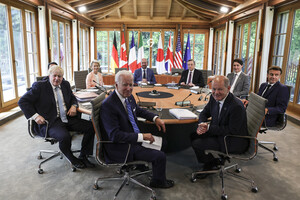The world's richest democracies will oppose China's dependence on developing countries, particularly in Africa and Asia

The world's richest democracies, the G7 countries, announced a $ 600 billion global infrastructure initiative during its Bavarian summit on Sunday (June 26th) dollars, designed to effectively counter China's efforts to exert political and commercial influence in the world through massive investment in developing economies. This was reported by Politico.
It is about opposing China's One Belt, One Road initiative, which seeks to make China dependent on third world countries and developing economies, especially in Asia and Africa, through large investments. U.S. officials have repeatedly claimed that countries that enter into business ties with China fall into debt and become overly dependent on it. The plan was first unveiled at last year's G7 summit in the UK and was dubbed “Build a Better World”. But now the changing agenda in the world has led to a new name – “Partnership for Global Infrastructure”.
Read also: China wants to help Russia, but fears sanctions – Washington Post
The G7 plan aims to pool its resources by offering developing countries funding to cut off heat. The first example of such cooperation, which will result in a transition to clean energy, is being implemented in South Africa, while others are being discussed in India, Indonesia, Vietnam and Senegal. German Chancellor Olaf Scholz said on Sunday that Berlin's contribution to South Africa would be 300 million euros.
The initiative is actively supported by US President Joe Biden, who said at the Bavarian summit that “our nation and the world are at a real turning point in our history.” He added that the choice of developing countries in favor of the West will protect them from future shocks from climate change and pandemics and prepare them for the digital age.
Read also: G7 meeting and “Marshall Plan” for Ukraine
The United States seeks to raise $ 200 billion for the program over the next five years through a combination of federal funding and private sector investment. Another € 300 billion will be provided by EU countries. Together with the contributions of other members, the total cost of implementing this float will be $ 600 billion.
The publication adds that Biden avoids the word “China”, but makes it clear that it is precisely the opposition to China, saying that when democracy will do everything we can offer “, they will defeat the autocracy. “We offer the best options for people around the world,” he said.
Read also: G7 leaders agree to ban new gold imports from Russia
European Commission President Ursula von der Leyen stated that the plan aims to give the world “a positive strong investment impetus to show our partners in developing countries that they have a choice.”
Recall concerned about the global economic crisis >, which is approaching the world, G7 leaders still declared indefinite support for Ukraine in its opposition to Russian aggression .




